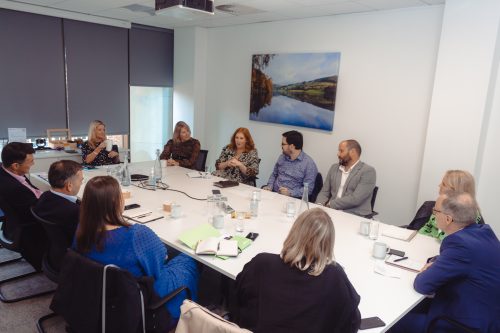Engaging new starters in a world of remote working

Lockdown was a tough time for business leaders accustomed to face to face engagement. But it’s even tougher to engage new starters in the post-Covid environment
That’s one on the issues discussed in Grant Thornton’s Sheffield office on September 8 as part of a series of leadership round tables run by TheBusinessDesk.com in partnership with CMS, Grant Thornton and Quarterdeck.
Tanya Holt, partner at law firm CMS, said, “When everybody was at home, the communication was really difficult. You’re saying, ‘Come on a Team call and I’d like to see you.’ But you have to be careful about intruding into their space.
“It’s quite easy for people to put up a front and say everything’s fine when it isn’t. And just trying to eke out if there is an issue without being too intrusive is really tricky.”
But if leaders found keeping established staff engaged during remote working, teams could at least draw on their social capital to pull them through.
What of new team members? In an event focused on leadership, the conversation naturally turned to the issue of mentoring future leaders.
Edward Naylor, CEO of Naylor Industries, summed up the problem of remote working. “Where’s that 21, 22, 23 year old going to learn? Water coolers is part of it.
“It worries me. How much if a commitment can a person have to a business where he doesn’t really know his colleagues and doesn’t have the banter? I worry about the next generation not having the visibility of the group above them to learn.”
Katrina Ritchie, people and culture director at Gripple, added, “I think we’re going to have a crisis in 10 years’ time in having leaders, effective leaders, in business, because they’re not developing. How can young people develop their leadership skills when they’re sat behind a screen somewhere else? They can’t.
“It could affect our economy, all sorts of things in terms of the way our businesses are going. It’s crucial, and it’s overlooked by a lot of groups in terms of this working at home hybrid. Who’s going to be leading our businesses in 20, 30 years’ time?”
Alexis Krachai, managing director of Counter Culture, took a more sanguine approach. Today’s leaders were, he pointed out, once the future generation. “It’s not the challenges. In 10 years’ time there’ll be another crisis. We have one a week at the moment – they’re like buses. But they will find their way. That’s what humans do. We have an amazing ability to adapt and be resilient.”
With concerns in the open and cards on the table, the leaders began to share their solutions
Laura Boutrell, managing director of Quarterdeck, makes a point of contacting all new starters. “Wherever they are in the country, I’ll always just pick up the phone and have half an hour chat – or quite often it’s on Teams – just to understand a bit about them and what their background is, and start to encourage them to think about what they want in their role. And also how they’re going to develop.”
But in an insight reminiscent of Stephen Covey’s circle of influence and circle of concern model, she added, “There will be a different generation that comes though. And maybe we’re just old fashioned and actually they’ll just communicate vertically. And that will be fine.”











